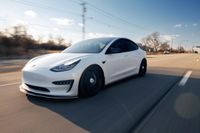Chinese electric car giant BYD launches Han sedan in the Middle East
Chinese electric car company BYD has launched its flagship Han sedan in the United Arab Emirates, signaling a push into the Middle East market.

BYD launches Han sedan in the Middle East
Chinese electric car company BYD announced that it has launched its flagship Han sedan in the United Arab Emirates (UAE) this week. The company has not disclosed when deliveries will begin, but its local website shows that BYD is also offering its ATTO 3 for sale in the UAE. This move represents another step by Chinese businesses to expand into the Middle East, as geopolitical tensions have made it more difficult for them to enter the US or expand in Europe. Middle Eastern countries like Saudi Arabia have multi-year plans to reduce dependence on fossil fuels.
BYD opened a showroom in Dubai Festival City in collaboration with Al-Futtaim Electric Mobility Company. In March, a press release stated that Al-Futtaim would represent BYD in the UAE and the company plans to launch four car models, fully electric and hybrid, in the market by the end of the year.
Chinese electric car startup Nio also made its presence felt in the Middle East by announcing in June that it received $738.5 million from a fund owned by the Abu Dhabi government.
BYD's growth in the auto market
BYD has experienced rapid growth in China's domestic auto market and has been gradually expanding its passenger car business overseas. It initially launched the Han sedan in China in 2020, and the car quickly became one of the top 10 best-selling new energy vehicles in the country. The Han sedan is available in hybrid and pure electric versions powered by BYD's 'blade battery'. This success in China has likely bolstered BYD's confidence in expanding to international markets like the Middle East.
The expansion of BYD and other Chinese electric car companies into the Middle East reflects a global push towards renewable energy and reducing dependence on fossil fuels. As countries set long-term goals to transition to clean energy sources, electric vehicles are playing a crucial role in achieving these targets.
The future of electric vehicles
The launch of BYD's Han sedan in the Middle East highlights the increasing popularity of electric vehicles worldwide. The global electric vehicle market is expected to grow significantly in the coming years as more countries prioritize sustainable transportation and implement policies to encourage EV adoption. Additionally, advancements in battery technology and charging infrastructure are further driving the shift towards electric vehicles.
Investors are also taking notice of the potential of the EV market. Battery stocks have been identified as stand-out investments, with expectations of significant growth in the industry. The semiconductor sector, particularly companies involved in EV-related chip production, is also experiencing an upturn and has been named as an attractive investment opportunity.
As the demand for electric vehicles continues to rise, both established car manufacturers and new startups are entering the market to capture a share of the growing industry. This competition is resulting in technological advancements, increased affordability, and a wider range of options for consumers.


